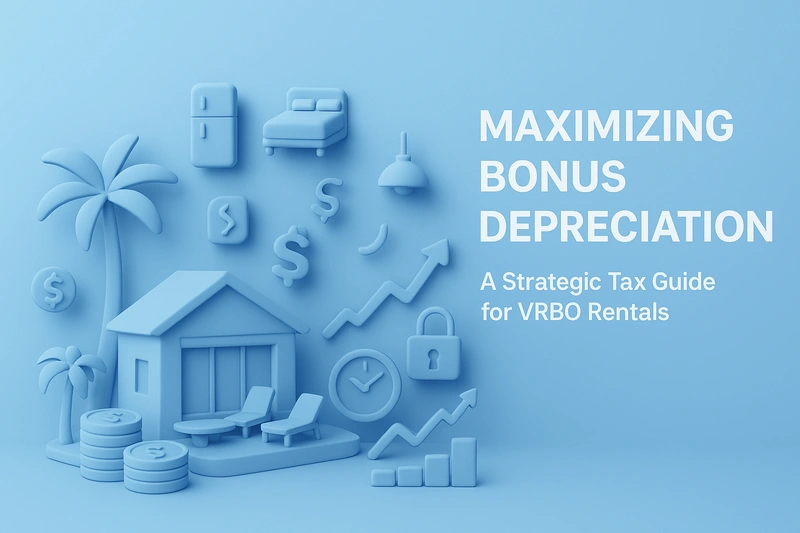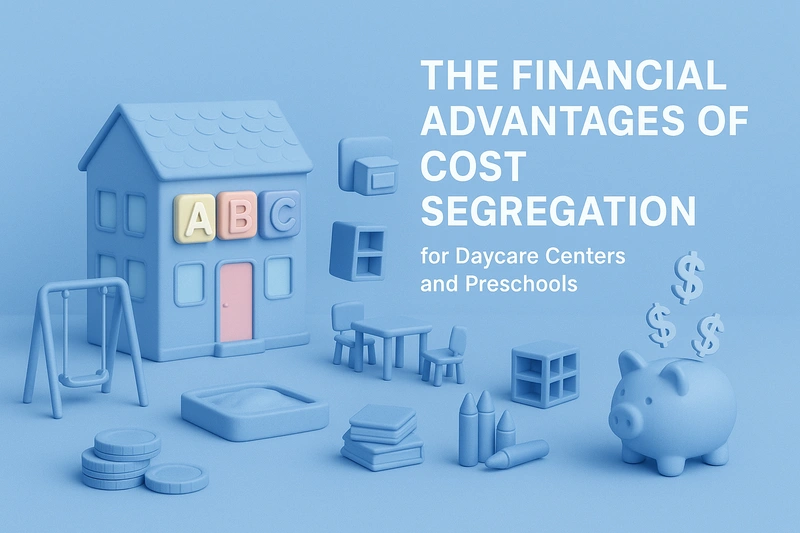I still remember a conversation I had with a client who had just purchased a three-bedroom waterfront property in Destin, Florida, intending to turn it into a premium VRBO rental. She had already committed nearly $45,000 to upgrades: solid wood bedroom sets, stainless steel appliances, new patio furniture, and a full landscaping refresh. What she didn’t realize was that a large portion of those costs could be written off in the first year through bonus depreciation.
Once we ran the numbers, her first-year deduction came to just over $38,000, cutting her federal tax bill by nearly $13,000. She used those savings to book professional photography, upgrade her booking software, and launch a paid search campaign. These were all moves that pushed her occupancy above 80% in the first season.
Why Bonus Depreciation Is a Game-Changer for VRBO Investors
Standard depreciation spreads deductions over decades (27.5 years for residential rental property), making it a slow process. Bonus depreciation accelerates that timeline by allowing a full deduction of certain asset costs in the first year they’re placed in service. For VRBO owners, that means you can write off the cost of short-lived assets like appliances, furniture, and fixtures right away, improving cash flow and freeing up capital for growth.
Recent Tax Law Changes and Their Impact on VRBO Rentals
Under recent federal tax legislation, 100% bonus depreciation is now available for qualified assets that are both acquired and placed in service after January 19, 2025, with no scheduled phase-down. This change is permanent unless modified by future law.
Assets acquired before January 20, 2025, including those subject to a binding written contract before that date, remain subject to the previous phase-down rates, even if placed in service after January 19, 2025. For VRBO investors, this means timing both the acquisition and the placed-in-service dates is crucial to maximize first-year deductions under the new rules.
The practical impacts include:
- Full first-year write-offs restored. Qualifying assets purchased and placed in service after January 20, 2025 can be fully expensed in year one rather than depreciated over multiple years.
- Applies to both new and used property. As long as the asset is new to you, it qualifies; it doesn’t have to be brand-new from the manufacturer.
- Timing matters. Placing assets in service before the cutoff date could reduce your deduction to 60% or less under the prior phase-down schedule.
- Permanent change (for now). Unlike the 2017 rules, which were set to phase out, the current law has no automatic sunset.
- State conformity varies. Some states will not follow federal bonus depreciation rules, so your state tax deduction may differ.
- Greater incentive for cost segregation. More components now yield immediate deductions, making cost segregation studies even more valuable.
Which Components of VRBO Rentals Qualify for Bonus Depreciation
The building itself doesn’t qualify for bonus depreciation because of its 27.5-year recovery period. However, many components do, provided they have a recovery period of 20 years or less. Examples include:
- Furniture and beds
- Appliances such as refrigerators, ovens, and washers/dryers
- Carpeting and some types of flooring
- Light fixtures
- Landscaping improvements
A cost segregation study can help identify and categorize these assets so they can be depreciated faster. Without such a study, many qualifying components end up lumped into the building’s longer depreciation schedule, costing you upfront tax savings.
STR Tax Classification: Passive vs. Active and Why It Matters
Whether your VRBO is classified as a passive or non-passive activity can determine if bonus depreciation benefits you in the current year. If the property qualifies as a short-term rental (typically with an average guest stay of seven days or less), and you materially participate, your rental activity can be considered non-passive.
That means depreciation losses can offset other active income, like wages or business earnings. If it’s passive, the losses may be limited to offsetting passive income only, though they can still be carried forward.
Timing Is Everything: Placing Assets in Service After Jan. 19, 2025
The restored 100% bonus depreciation applies only to assets placed in service on or after January 20, 2025. “Placed in service” means ready and available for its intended use. For example, if you purchase furniture in early January but the property isn’t ready to accept guests until February, the in-service date is February, and you would qualify for the full deduction.
Strategically timing purchases and installations could make a difference of tens of thousands of dollars in deductions.
Potential Costs, Risks, and Planning Pitfalls
Cost segregation studies generally cost between $2,800 and $5,000, but for properties with significant qualifying assets, the tax benefit often outweighs the expense many times over.
However, accurate documentation is critical. Overstating qualifying assets or misclassifying property components can lead to IRS scrutiny. Owners should also watch for state-level differences. Some states don’t conform to federal bonus depreciation rules, which can affect your state tax bill.
Finally, remember that depreciation deductions can trigger depreciation recapture tax when you sell, so plan your exit strategy accordingly.
How It Works in Practice
Imagine acquiring a VRBO property for $500,000. Through a cost segregation study, you identify $130,000 in assets eligible for 100% bonus depreciation. Because you will be placing those assets in service after January 20, 2025, you can deduct the entire $130,000 in year one.
For an investor in the 35% federal tax bracket, that’s a $45,500 reduction in federal taxes alone, cash that can be reinvested into the property or used for other business purposes.
Strategic Planning Tips for VRBO Investors
- Time acquisitions and upgrades to align with bonus depreciation eligibility dates.
- Use a cost segregation study for higher-value properties.
- Actively manage the property to meet material participation standards.
- Keep records of asset costs, in-service dates, and supporting invoices.
- Consult a tax professional familiar with short-term rental rules.
Addressing FAQs and Myths
- Is bonus depreciation mandatory? No. You can opt out on a class-by-class basis if it better fits your long-term tax strategy.
- Do used assets qualify? Yes, as long as they’re new to you and placed in service during the eligible period.
- Can Section 179 be used instead? Section 179 expensing is another tool, but it has different limits and qualifications. In some cases, it can complement bonus depreciation.
Smart Next Moves for Purposeful Tax Optimization
Bonus depreciation offers VRBO investors a unique opportunity to reduce taxable income dramatically in the first year. By aligning property improvements and acquisitions with eligibility timelines, actively managing your rental to meet participation rules, and leveraging a cost segregation study, you can unlock significant financial advantages.
If you’re ready to maximize the benefits of bonus depreciation for VRBO rentals in your portfolio, now is the time to act strategically. Partnering with a specialist like R.E. Cost Seg ensures your property is analyzed in detail and your deductions are fully optimized, turning a tax break into a lasting investment advantage.



%2520(1).avif)


